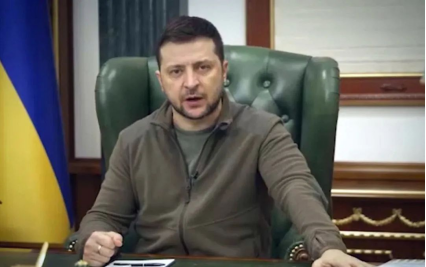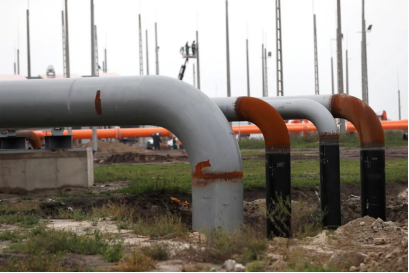近日,欧盟在法国凡尔赛宫举行了非正式峰会,冯德莱恩表示乌克兰是欧洲的一份子,但马克龙及其他国家领导人明确表示乌克兰不会有快速加入的通道。欧盟对此的态度究竟是什么样的呢?我院赖雪仪副教授就以上问题接受China Daily记者采访,以下为原文转载:
EU accession must wait,
Zelensky told

This handout video grab taken and released by the Ukraine Presidency press service on March 12, 2022 shows Ukrainian President Volodymyr Zelensky speaking in capital Kyiv. [Photo/Agencies]
Exact date for ending Russian energy dependence not agreed within bloc
European Union leaders have failed to agree on a date to end energy dependence on Russia and on granting Ukraine fast-track membership, and French and German leaders are continuing to seek diplomatic resolutions to the conflict.
Leaders of 27 EU member states meeting for an informal summit in Versailles, near Paris, on Thursday and Friday "acknowledged the European aspirations" of Ukraine and vowed to strengthen their ties with Kyiv, but ruled out quick accession to the bloc sought by Ukrainian President Volodymyr Zelensky, who signed a formal application on Feb 28.
"Today we have opened the pathway toward us for Ukraine," European Commission President Ursula von der Leyen said after the meeting. "They are part of the European family."
However, France's President Emmanuel Macron, host of the summit, made it clear that there will be no fast-track accession for Ukraine.
"The answer is no," he said after the summit.
Other major European leaders echoed the view, with Dutch Prime Minister Mark Rutte saying earlier that there was "no such thing as a fast-tracking of accession-that doesn't exist" and German Chancellor Olaf Scholz emphasizing that "it's very important that we continue to pursue the things we have decided in the past", pointing to the association agreement between the EU and Ukraine in 2017 as a way to strengthen ties.
Failing to agree on a date to cut energy dependence on Russia, the EU leaders promised only to "phase out our dependency on Russian gas, oil and coal imports as soon as possible".
The United States has announced a ban on Russian energy, but the EU is the largest buyer of Russian oil and gas, with Germany being the largest importer of Russian energy in the EU.

Gas pipelines are seen in a gas distribution center near the Serbian border in Kiskundorozsma, Hungary, September 28, 2021. [Photo/Agencies]
Irreplaceable role
Scholz indicated days ago that "at the moment, Europe's supply of energy for heat generation, mobility, power supply and industry cannot be secured in any other way".
Hungary's Prime Minister Viktor Orban said on Friday that "there will be no sanctions covering oil and gas, which means that Hungary's energy supply is guaranteed for the next period".
While von der Leyen had proposed 2027 as a firm end date, EU leaders at the summit did not commit to an exact date, and only asked the European Commission to come up with a plan in May.
Zelensky on Friday expressed his disappointment with the EU, saying it should "do more" for Ukraine.
Von der Leyen said on Friday that from the following day the EU would start imposing sanctions on Russia, including banning the exports of any EU luxury goods to it and banning imports of key goods in the iron and steel sector from it.
On Saturday, Macron and Scholz held a joint phone call with Russia's President Vladimir Putin.
Ding Chun, director of the Center for European Studies at Fudan University in Shanghai, said France and Germany have not stopped their mediation.
"Germany and France are clear that they cannot totally follow the actions taken by the US and the United Kingdom," Ding said, adding that both the US and the UK are not adjacent to Ukraine.
Scholz and Macron know well that Russia is not going to move anywhere, and totally cornering Putin without offering an off-ramp is bad for them and Europe, Ding said.
"German and French leaders want to resolve the conflict as soon as possible because the longer it lasts, the more costly it is for them."
He described Scholz and Macron as rational leaders despite some public pressure for more radical actions.
Lai Suetyi, associate professor in the Center for European Studies at the Guangdong University of Foreign Studies, said: "It's nice to see more EU member states being pragmatic regarding Ukraine's accession to the EU. The painful process of integrating the new members from the 2004 big-bang enlargement has been felt strongly in recent years."
Fast-track admission would be "romantic" but "very painful" for the EU, she said.
"The Versailles summit rejected such romantic expectations of the EU and showed that the majority of EU leaders choose to be pragmatic."
On the inconclusive results of cutting off Russian energy, Lai said the summit showed that "many of the EU member states are cautious on the price they would bear in aiding Ukraine".
专家简介
赖雪仪,广东国际战略研究院研究员,副教授,研究及教学方向集中在欧洲政治、亚欧关系、中欧关系及亚欧会议。
文章来源
China Daily